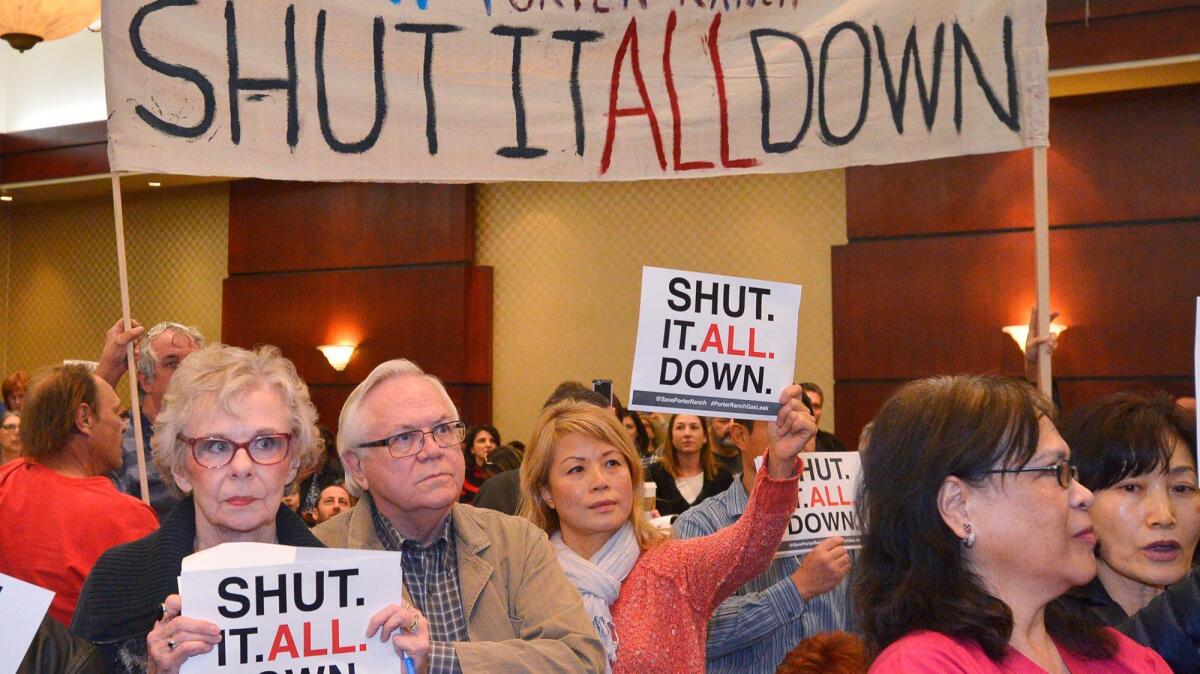Editorial: Don’t reopen Aliso Canyon until we know what caused the worst methane leak in history

In the wake of the Aliso Canyon methane leak — the largest such leak in U.S. history, which temporarily displaced 8,000 families from their homes — what’s wrong with using some common-sense caution before reopening the natural gas storage facility?
Sen. Henry Stern (D-Canoga Park) has proposed doing just that. His bill — Senate Bill 57 — would not allow the Southern California Gas Co. to start reinjecting gas into its underground natural gas storage field until an independent study determines exactly what caused the well failure and massive leak in the first place.
That independent study, called a root-cause analysis, was ordered by state gas regulators and the California Public Utilities Commission in December 2015. It’s supposed to answer critical questions, such as how the massive leak happened and whether there are enough protections in place to prevent another one. At a hearing last month, a CPUC official said the root-cause analysis is the “ultimate level of safety.”
However the study won’t be completed until the fall, at the earliest, and SoCal Gas doesn’t want to wait that long to restart operations. State regulators could allow the facility to reopen any day. SB 57 would take effect immediately to ensure that doesn’t happen without the root cause determination. But the bill has been blocked by Stern’s fellow Democrats.
This week, after delaying a hearing on the bill for month, Sen. Ben Hueso (D-San Diego) yanked SB 57 off the agenda of the Senate Energy Committee, which he chairs. Hueso’s committee had offered amendments — proposed by SoCal Gas — that would have gutted the bill. Stern rejected the amendments and Hueso pulled the item from the agenda citing a “great deal of misunderstanding” among members, according to his staff.
Hueso must not keep stalling this important legislation. The fate of Aliso Canyon is far too important.
Some residents in Porter Ranch continue to suffer health effects they believe are linked to Aliso Canyon emissions. Los Angeles County health and fire officials say that SoCal Gas and state regulators have not yet demonstrated that Aliso Canyon is safe to re-start. The county has sued the state to block the reopening until the root cause analysis is completed, along with a new emergency response plan and an analysis on how to protect wells in the event of a major earthquake.
But SoCal Gas and business groups continue to warn that Southern California runs a greater risk of gas shortages and power outages as long as Aliso Canyon is closed. Last year, state energy officials warned the region could experience as many as 14 days of rolling blackouts during the summer if power plants couldn’t use gas stored in Aliso Canyon. There were no blackouts. Nor were there any serious gas shortages during the winter. (SoCal Gas said it had to temporarily withdraw gas from Aliso Canyon in January to avoid a shortage during a cold snap, although environmentalists and a county report questioned whether that was really necessary.)
Both sides raise legitimate points, but Stern’s bill includes a provision allowing the governor to order Aliso Canyon back into service if there is a bona fide gas shortage. That emergency provision helped mollify the Los Angeles Department of Water and Power. Mayor Eric Garcetti and the City Council also support the bill. The Aliso Canyon leak was an extreme environmental and public health accident, and lawmakers ought to support extreme caution in deciding whether to reopen the facility.
Follow the Opinion section on Twitter @latimesopinion and Facebook
More to Read
A cure for the common opinion
Get thought-provoking perspectives with our weekly newsletter.
You may occasionally receive promotional content from the Los Angeles Times.










